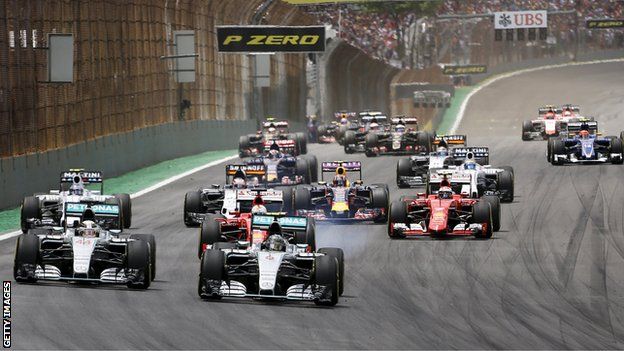F1 bosses reach an agreement for reduced engine costs
- Published

The engine agreement was reached after talks between the F1 Strategy Group in Geneva
Formula 1 bosses have agreed to reduce the cost of engines for customer teams.
Two days of talks have resulted in a deal to cut prices as well as ensure the whole grid is supplied, sources at governing body the FIA said.
In return for lower prices, it was agreed F1 would stick with the existing V6 turbo hybrid engines until at least 2020.
Details are still being finalised, with the intention for the new regulations to come into force in 2018.
Four engine manufactures - Mercedes, Ferrari, Renault and Honda - supply the power units for the 11 teams on the grid.
In a further measure to help reduce costs, it has been agreed that drivers will be limited to three gearboxes per season - down from the current limit of five.
The lower price at which engines will be sold in the future has not been made public at this stage.
The FIA was aiming at a figure in the region of £7.9m to £9.5m, down from the current cost of around £13.8m to £17.7m, and it is believed this target has been reached.
The agreement also brings an end to the threat of the introduction of a cheaper alternative engine, sources say.
This was rejected by teams last autumn after being proposed by F1 boss Bernie Ecclestone and FIA president Jean Todt following a failure to agree a cap on the cost of customer engines.
However, the possibility of Todt and Ecclestone enforcing a change remained - at least in theory - after the FIA voted last month to give them power to make necessary changes to keep costs under control.
Insiders say this was in reality an empty threat as teams would have taken legal action had anything been introducing outside the agreed rule-making protocol, which is written into the teams' contracts.
The push for an alternative engine followed the crisis Red Bull found itself in last season.
The team's factory relationship with Renault came to an end in 2015 amid acrimony on both sides and they were unable to secure a supply from rivals Mercedes, Ferrari and Honda.
Red Bull have a stop-gap solution for 2016, using a Renault engine badged with the name of a sponsor to de-emphasise the partnership in a year that sees the French car manufacturer return as a team owner in its own right after buying Lotus.
But Red Bull's deal is only for one year, and the former champions still have to secure an engine supply for 2017.
- Published18 January 2016
- Published24 January 2016
- Published19 January 2016
- Published18 December 2015
- Published2 November 2018
- Published26 February 2019